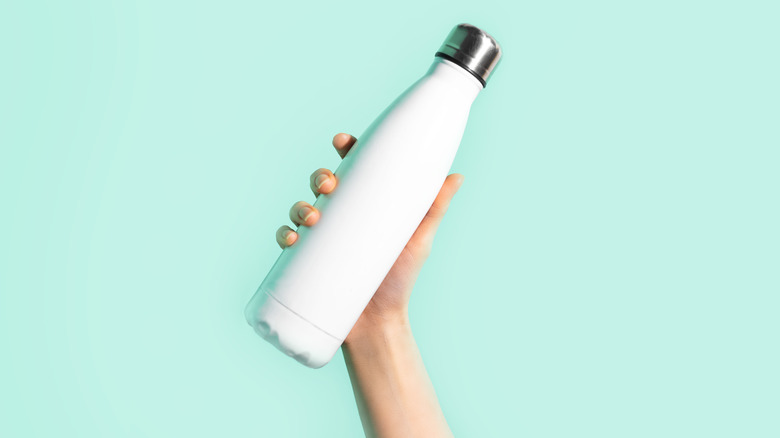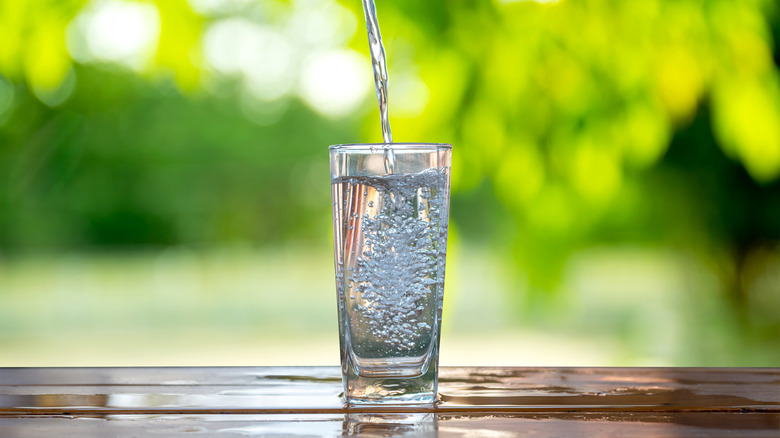How Much Water You Should Actually Be Drinking Every Day
Mineral, seltzer, tonic, spring, alkaline, distilled — it's hard to fathom that there are so many variations of the same colorless, tasteless substance without a single calorie. Whether you get your water from a plastic bottle or straight out of the tap, the most important thing is that you get it. The human body is 60% water, reports GoodRx, providing a variety of important functions crucial to survival, including joint lubrication, temperature regulation, mouth cleaning, waste removal, and transporting nutrients through the bloodstream.
Apps have even been created to encourage folks to drink water. Plant Nanny, for instance, rewards users for every cup they drink by allowing them to water a cartoon plant; the health of the plant is directly linked to how much water the user drinks and logs into the app. Considering that adequate water intake is so crucial to human wellbeing, it might seem surprising that 75% of Americans could be living in a state of chronic dehydration, according to CBS. Or, perhaps you might not be shocked at all. Madelyn Fernstrom, NBC News health editor, reports that it's common for people to view drinking water as a chore, per MSNBC. But, whether you love it or hate it, water intake is an integral part of sustaining long-term health and wellbeing. So, how much of it should you be drinking per day?
The answer is ... complicated
It will likely come as no surprise that not all bodies are created equal. Factors such as the temperature, season, environment, the geographic location you live in, breastfeeding status, and your activity level all affect how much water an individual needs to stay hydrated, says Healthline.
According to the U.S. National Academies of Sciences, Engineering, and Medicine, men should intake 15.5 cups of fluid per day, and women should intake 11.5 cups, via water, other beverages, and food, per the Mayo Clinic. Harvard says four to six cups is enough for generally healthy people.
A study by Michael N. Swaka, Ph.D., in Nutrition Reviews found that most adult men with no underlying medical conditions should strive for a daily water intake of 3.7 liters (about 16 cups), and 2.7 liters (about 12 cups) for women, via Oxford. WebMD recommends drinking between a half ounce to one full ounce of water daily per each pound you weigh. For example, it says, a person weighing 150 pounds should aim to intake 75 to 150 ounces (roughly nine to 19 cups) of water every day.
So, what's the answer? A combination of all these sources averages out to roughly 13 cups of water per day to maintain hydration. But, of course, listen to your body, and take your individual health needs and conditions into consideration in determining what's best for you.
A moderate approach to staying healthy
Roxanne B. Sukol, a medical doctor and preventative medicine specialist at the Cleveland Clinic, describes the signs that might indicate dehydration. Dark urine with a strong odor is a telltale clue, she says, but dizziness, constipation, stomach cramps, and excessive fatigue can all be indicators as well.
On the flip side, Medical News Today cautions against drinking too much water. Overloading on water can cause hyponatremia, which can occur when the blood plasma sodium levels become dangerously low. Hyponatremia can cause symptoms as mild as headache and fatigue or as serious as brain swelling and coma.
According to the CDC, there is no specific set recommendation for how much plain water a person should drink. Instead, it suggests that a combination of obtaining water from eating natural foods and from drinking plain water is a realistic and attainable way to stay healthy and hydrated.


